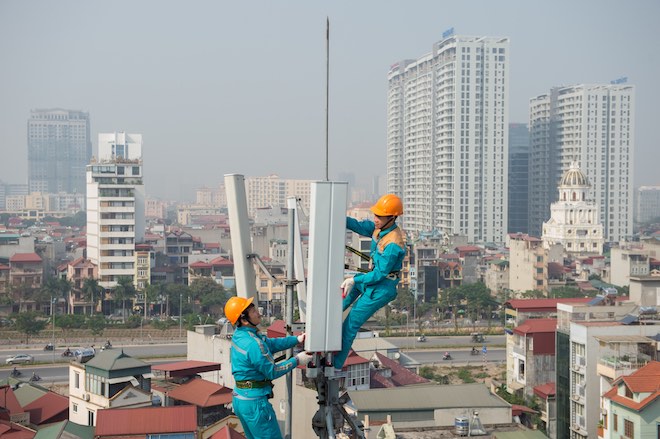Nikkei: Vietnam's top telecom to adopt 'self-developed' 5G tech

Viettel will run the trial of 5G in 1 year. Photo: Zing
"Viettel has invested millions of dollars to develop 5G chips and is working on developing devices with 5G chips," a company representative told the Nikkei Asian Review on Monday.
The telecom aims to complete the trial for an initial version of a 5G broadcast station this year, then test a 5G station network by 2020 and offer products in 2021, the representative said.
About half of Vietnam's subscribers to high-speed mobile services use those offered by the company, formally known as Viettel Military Industry and Telecoms Group.
Southeast Asia is at the forefront of 5G competition as the tech showdown between the U.S. and China intensifies. The choice of either Western or Chinese technology could draw a piding line in the region.
While Thailand, the Philippines and other countries lean toward Huawei, Vietnam looks to pursue its own path. Major Vietnamese telecom companies are seen to lean on proprietary or Western technology to launch their 5G services.
Viettel's 5G efforts focus on the advanced chipsets housed inside the core element designed to process data from numerous devices connected to the network.
However, Viettel’s ambition to develop its own semiconductors for the core networks could be challenging as it requires accumulated efforts and years to bear fruit. Meanwhile, it will need numerous different chips to build a reliable system.
Market leaders Huawei, Nokia and Ericsson still rely on chip developers including Intel, Xilinx, Broadcom, Skyworks, Qorvo and others to provide the high-end chips needed for competitive 5G systems. In addition, Huawei has poured billions of dollars a year into research and development to secure its leading position in the 5G era.
Given its insufficient accumulation of the needed expertise, however, Viettel might choose equipment made by Nokia or Ericsson, depending on its progress in the ongoing tests, according to the press reports.
"As it self-develops its 5G chips, Viettel is continuing to look for more opportunities to cooperate, invest and share experiences with experts and partners, both at home and abroad," the Viettel representative told the Nikkei.
Viettel decided to develop and produce core network equipment "to avoid the risk of being unable to support the safety and security of the national telecommunications network," the representative said. Viettel aims to produce "80% of our telecom core network infrastructure" equipment by 2020.
Vinaphone, the country's second-ranked operator, reportedly is preparing to collaborate with Finland's Nokia. Third-ranked Vietnam Mobile Telecom Services One Member, also known as MobiFone, reportedly intends to work with Samsung Electronics of South Korea.
Vinaphone and Nokia agreed last year to develop 5G solutions together, and the two companies are discussing plans for an R&D center that would cover the "internet of things" and network technologies.
"Local carriers generally prefer Western brands, and Huawei is being affected by the current accusations by the U.S. and boycotts of its products by other countries," a top executive at a major tech company based in Vietnam who requested anonymity told the Nikkei Asian Review.
"While Huawei had dominated Vietnam's market with its flexible services and competitive prices, the race had been changing after other vendors, including Ericsson and Nokia, changed their price strategies for their Vietnamese partners," the executive said. "However, Huawei still has chances to provide some kind of devices for 5G services in Vietnam."
Huawei thinks it stands a good chance of being chosen to supply 5G equipment to Vietnam./.
( VNF/Nikkei Asia )
Recommended
 National
National
Vietnam News Today (Jun. 5): PM sets off for attendance at UNOC 3 in France, official visits to Estonia, Sweden
 National
National
Vietnam News Today (Jun. 4): Vietnam - Promising Candidate for Southeast Asia’s Next Powerhouse
 National
National
Shangri-La Dialogue 22: Vietnam Highlights Some Issues of Ensuring Stability in a Competitive World
 National
National
Vietnam News Today (Jun. 3): PM Pham Minh Chinh to Attend UN Ocean Conference, Visit Estonia, Sweden
 National
National
Vietnam News Today (Jun. 2): Vietnamese Trade Mission Sounds Out Business Opportunities in United States
 National
National
Vietnam News Today (Jun. 1): Vietnamese, Japanese Firms Foster Partnership
 National
National
Vietnam News Today (May 31): Vietnam Strongly Supports Laos’s National Development
 National
National
